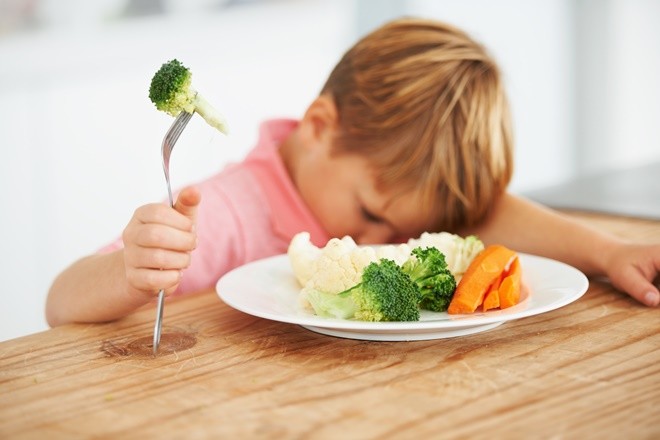Every day in every home where there is littlechild, you can hear a jerky, barking, command: "Eat! Do not play with food! "However, the scientists advise: relax already. Let him play. Why? Because it increases the likelihood that your baby will still eat what you have prepared for him. The researchers found that children who were allowed to feel, twirl and even throw away products such as spinach, bananas and tomatoes, are more favorable to them then reacted. That is eaten. Maybe because they were tired to play and had to refresh themselves? However, scientists believe that this kind of sensory play helps children overcome their inner resistance and still digs what they did not want. Photo:GettyImagesTo confirm this theory, an experiment was conducted. 60 children were divided into three groups. One group was given bowls with broccoli, carrots, spinach, radishes, bananas, peas, oranges, lemons and other vegan delights, even blueberries. Using all these products, they were asked to recreate the plot of the book "The Very Hungry Caterpillar". The children were allowed to scatter, crush, and break the vegetables if necessary. The second group was offered all the same, but instead of food they had inedible things - pom-poms, glitter, feathers and other interesting, but completely tasteless things. The third group was asked to play vicariously - instead of them, one of the researchers laid out the food. Then the children were asked to try any of their "toys" if they wanted. And it turned out that the children who played with the vegetables themselves ate much more of them than their "competitors." - They had time to get to know and interact with the food. Therefore, we believe that it is not only about the taste of the products. Moreover, the children were most interested in previously unfamiliar food: pomegranates and kiwi, - the scientists explain. And they emphasize: the children tried the fruits and vegetables of their own free will. During the experiment, there was no talk of trying anything. - The goal was to touch and try to create something from the products. Perhaps such creative activity stimulates the child's interest in trying the "toy," the researchers added. Do you understand what the point is? If a child categorically refuses to eat broccoli, let him play with this poor cabbage. After all, if you press him, there will be no sense anyway. Perhaps only a persistent reluctance to deal with this incomprehensible green thing for the next fifteen years. And here they don’t even have to be forced. The results, needless to say, are inspiring. Now, according to experts, only 10-15 percent of preschoolers eat the recommended amount of vegetables and fruits every day. If earlier it was believed that children do not eat healthy food simply because they do not like it, now there is an opinion that games with food can serve as a catalyst for the formation of healthy taste preferences in children. And, by the way, if all these scientists had children, they would know: children taste everything. On any toy, be it a book or a doll, you can find traces of children's teeth. It is not surprising that food is no exception. Only insidious adults always ruin such an interesting game. Also interesting:
Photo:GettyImagesTo confirm this theory, an experiment was conducted. 60 children were divided into three groups. One group was given bowls with broccoli, carrots, spinach, radishes, bananas, peas, oranges, lemons and other vegan delights, even blueberries. Using all these products, they were asked to recreate the plot of the book "The Very Hungry Caterpillar". The children were allowed to scatter, crush, and break the vegetables if necessary. The second group was offered all the same, but instead of food they had inedible things - pom-poms, glitter, feathers and other interesting, but completely tasteless things. The third group was asked to play vicariously - instead of them, one of the researchers laid out the food. Then the children were asked to try any of their "toys" if they wanted. And it turned out that the children who played with the vegetables themselves ate much more of them than their "competitors." - They had time to get to know and interact with the food. Therefore, we believe that it is not only about the taste of the products. Moreover, the children were most interested in previously unfamiliar food: pomegranates and kiwi, - the scientists explain. And they emphasize: the children tried the fruits and vegetables of their own free will. During the experiment, there was no talk of trying anything. - The goal was to touch and try to create something from the products. Perhaps such creative activity stimulates the child's interest in trying the "toy," the researchers added. Do you understand what the point is? If a child categorically refuses to eat broccoli, let him play with this poor cabbage. After all, if you press him, there will be no sense anyway. Perhaps only a persistent reluctance to deal with this incomprehensible green thing for the next fifteen years. And here they don’t even have to be forced. The results, needless to say, are inspiring. Now, according to experts, only 10-15 percent of preschoolers eat the recommended amount of vegetables and fruits every day. If earlier it was believed that children do not eat healthy food simply because they do not like it, now there is an opinion that games with food can serve as a catalyst for the formation of healthy taste preferences in children. And, by the way, if all these scientists had children, they would know: children taste everything. On any toy, be it a book or a doll, you can find traces of children's teeth. It is not surprising that food is no exception. Only insidious adults always ruin such an interesting game. Also interesting:

Making Money with Desserts: Success Stories
Evgeniya Polischuk (Fedutinova) instagram:@evgeniyafedutinovavk.com/janeshomebaking– It all started with baking for family and friends. Gradually, I started posting photos of my baked goods on Instagram – and orders started coming in. I made my first custom-made cake on October 13, 2014, and a little earlier I started making macaroons and cupcakes. You could say that the business “found me”, I am very […]

Soups are cold recipes with photos
Cold cucumber soup with yogurt and lemonsorbet from the chef of the restaurant La Taverna Alexander Zhurkin Photo: Getty Images Ingredients: Plain yoghurt – 125 g Cucumber – 150 g Lemon/lime sorbet – 50 g Cocktail shrimp – 24 g Fresh ginger juice – 1 g Lime juice – 5 g Fresh orange juice – 5 g Parsley – 1 g Pink pepper – 1 g Watercress – […]

barbeque kebab
Pork tenderloin in glaze Photo:Dmitry Bayrak/dbstudioPreparation time: 20 minutes + marinating time.Calories: 454 kcal per serving.For 4 servings: 4 pork tenderloins (approximately 300 g each), 1 onion, 2 cloves of garlic, 1 tsp. lemon zest, 1 tsp. lemon juice, a pinch of ground cumin, coriander and turmeric, 1 tbsp. vegetable […]

Pierre Duacan: dietary recipes: Ducane diet
Beetroot soup Photo:Season’S, Luxury Hotels RepresentationYou will need:· Boiled beetroot – 60 g· Fresh cucumbers – 20 g· Red radish – 20 g· Green onions – 10 g· Egg – 1 pc.· Drinking mineral water – 200 g· Salt – 1 gPreparation:· Boil the egg and beetroot.· Grate the cucumbers, radish and part of the beetroot. Put everything […]





